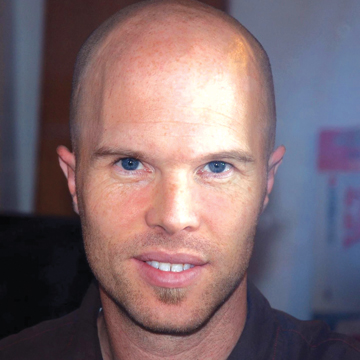Current Temperature
23.4°C
PRSD psychologist provides tips on staying motivated and connected during COVID-19 pandemic
Posted on April 29, 2020 by 40 Mile Commentator Photo submitted by Greg Godard
PRSD psychologist Greg Godard talked about his videos he has been making to pass on to students and parents on how to handle the COVID-19 pandemic at home.
Photo submitted by Greg Godard
PRSD psychologist Greg Godard talked about his videos he has been making to pass on to students and parents on how to handle the COVID-19 pandemic at home.Prairie Rose School Division psychologist, Greg Godard, has made a series of mini-videos on how students and their families can stay connected during the COVID-19 pandemic.
Godard’s purpose of the videos was to answer questions and connect with as many students as possible during quarantine.
“I was trying to answer questions that came up when I did connect with families. I still try to do some online check-ins with students and families when I can and when I have, I’ve gotten questions from them about how do apply myself to work, how do I get motivation to do my school work, I’ve got this wide open schedule and I’m not allowed to leave the house. I try to answer that in the most recent video,” said Godard.
In the three videos he has made this far, he has encouraged parents to speak openly and honestly about the COVID-19 pandemic.
“Often times parents really didn’t know how to bring things up like coronavirus with their kids, especially at the beginning,” he said.
“They didn’t want to raise a lot of fear in their kids or talk about something they didn’t fully understand. I was just trying to give some tips on how to approach those topics with their kids, how to be fully honest about facts and help them not get information from social media or rumour-based sites but from reliable sources.”
Godard says out of that he was encouraging people to allow themselves to feel their feelings, not avoid their feelings, to feel anxious and to feel a little bit confused.
“Many kids, especially young kids express to me that they’re feeling confused at the beginning of the quarantine and I think that had to do the fact that a lot of parents were feeling confused,” said Godard.
His message to parents and then relayed to their kids is a “clean, clear, developmentally appropriate understanding of the facts, which is the sickness that is passed by coughing, sneezing and breathing.”
He preaches to parents to make their kids aware, especially teenagers, that staying home is not about adults trying to control them or keep them away from their friends.
“It’s about keeping them and their friends safe,” he said.
The quarantining is “excruciating difficult” for teens to not be out with their friends “One of the most fundamental parts of their development and their brains is being with their buddies, but the world is telling them not to right now,” he said.
“I’m trying to help parents understand that their children’s frustration, exasperation, loneliness and sadness is all appropriate and encouraging them to understand reasons behind quarantine.”
Godard said the brain is designed at a young age to be consistently social referencing and looking for other people.
“To be pulled away from peers can be really difficult, especially that 11-year-olds and up where they’re connecting mainly outside the family,” he said.
“They talk about the word isolation, but the feeling of isolation is quite profound for a lot of these teens.”
He works with a lot of kids who have social anxiety or other kinds of anxiety and the students who feel anxious about being at school, those kids are feeling comforted by being allowed to be home, he added.
There will be an increased in depression as a result of not having that social connection.
His motivation at home for students is having a schedule and a checklist.
“If kids are actually scheduling for themselves, (so) setting aside a block of time in which they can do their school work, they have to treat it sacred. Even if they have no motivation, that little alarm goes on their phone, they have to go into the study area and they just start with the simple tasks off the checklist,” said Godard.
“Start with the easiest. Usually that will get the ball rolling. Treat that time even if it’s one hour, two hours max that they’re putting into their school work, treat it as sacred and when they’re time is up walk away an do something that is more fun.”
Sleep, exercise and diet are keys to positive mental health, he added.
The videos are available for viewing through Prairie Rose School Division’s Facebook page.
Leave a Reply
You must be logged in to post a comment.

